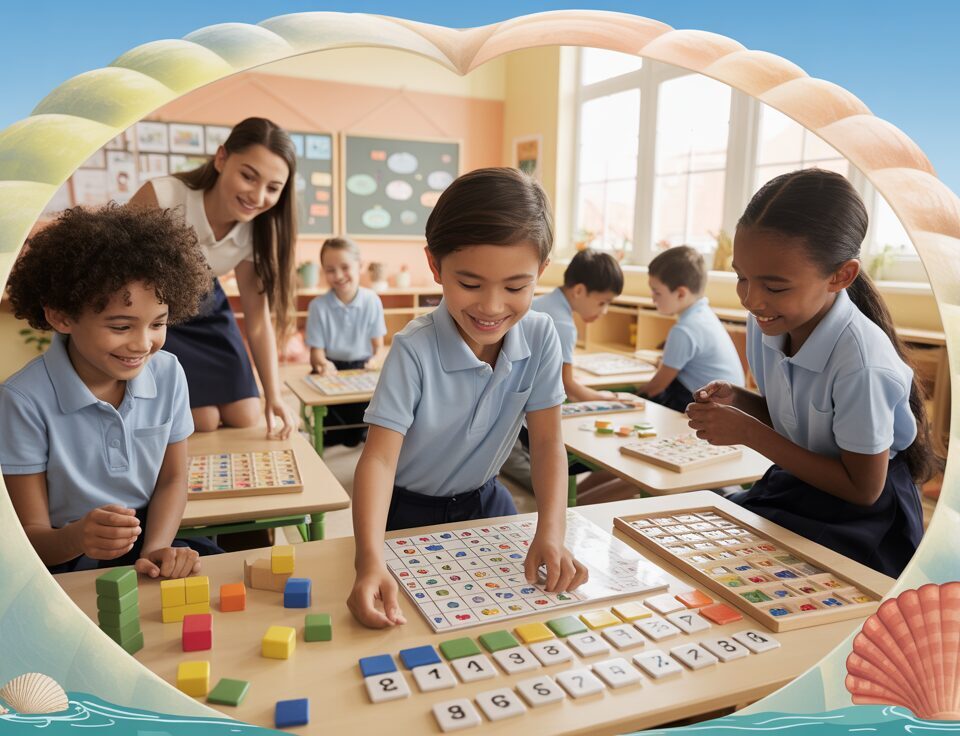
Visual Model Drawing: Mastering PSLE Math Word Problems with Confidence
October 19, 2025
How to Choose the Right Math Assessment Books for Your Primary School Child
October 21, 2025Table Of Contents
- Introduction: A Mathematical Transformation
- The Challenge: Understanding the AL5 Starting Point
- The Seashell Approach: Beyond Traditional Math Tutoring
- Week-by-Week: The 90-Day Journey to Excellence
- Overcoming Obstacles: Building Resilience Alongside Mathematical Skills
- Celebrating Success: The AL1 Achievement and Beyond
- Key Insights for Parents: Supporting Your Child’s Math Journey
- Conclusion: Lasting Mathematical Confidence
When 12-year-old Jayden first walked through the doors of Seashell Academy by Suntown Education Centre, his shoulders were slumped, and his eyes downcast. The recent Mathematics assessment results weighed heavily on him—an Achievement Level 5 (AL5) that seemed to confirm his deepest fears about his mathematical abilities. His parents were concerned, not just about the upcoming PSLE, but about their son’s plummeting self-confidence and growing anxiety around numbers.
“Math used to be fun for him,” Jayden’s mother explained during their initial consultation. “But somewhere along the way, he started falling behind. The more he struggled, the more he began to believe he simply wasn’t good at Mathematics.”
Fast forward 90 days. The same boy now confidently explains mathematical concepts to his peers, tackles complex problem sums with strategic thinking, and has achieved something remarkable—an AL3 in his school’s preparatory examination. This isn’t just a story about improved grades; it’s a testament to how the right educational approach can transform a child’s relationship with learning.
In this case study, we’ll take you through Jayden’s 90-day journey from mathematical frustration to flourishing, revealing the specific strategies, emotional support, and methodical approach that made this transformation possible at Seashell Academy.
From AL5 to AL3 in 90 Days
A Mathematics Transformation Journey
The Challenge
- P6 student Jayden struggling with AL5 in Mathematics
- Difficulties with visualization of problems
- Math anxiety causing careless errors
- Fixed mindset: “I’m not a math person”
The Outcome
- Achieved AL3 in preparatory examination
- Developed genuine mathematical understanding
- Gained confidence to explain concepts to peers
- Transformed relationship with learning
The Seashell Method: 90-Day Journey
Days 1-30
Building Foundations & Confidence
Days 31-60
Problem-Solving Strategies
Days 61-90
Mastery & Exam Preparation
The Four Pillars of Transformation
Personalized Learning Blueprint
Topic-by-topic mastery roadmap customized to address specific gaps and strengths
Visual Mind-Mapping Techniques
Transforming abstract concepts into visual representations for deeper understanding
Interactive Gamified Learning
Engaging activities that shift emotional association from anxiety to enjoyment
Small-Group Collaborative Learning
Safe environment with maximum 6 students where questions are celebrated
Key Insights for Parents
Address the Emotional
Mathematical difficulties are often as much about emotional barriers as conceptual understanding
Celebrate Process
Acknowledge efforts, strategies, and persistence, not just results
Connect to Real Life
Help your child see mathematics as relevant to their interests and daily experiences
The most valuable outcome: newfound mathematical confidence, curiosity, and resilience
The Challenge: Understanding the AL5 Starting Point
Before diving into Jayden’s transformation, it’s important to understand what an AL5 in Primary School Mathematics typically represents. Students at this level often struggle with:
- Applying mathematical concepts to problem-solving scenarios
- Understanding the language of mathematics and interpreting word problems
- Recognizing patterns and relationships between different mathematical concepts
- Organizing their thinking and working systematically through multi-step problems
- Mathematical confidence and positive self-belief
When our experienced MOE-trained educators at Seashell Academy conducted Jayden’s initial assessment, we identified specific gaps in his understanding. While he could perform basic calculations, he struggled with visualization of problems, particularly in topics like fractions, ratio, and geometry. His work showed a pattern of careless errors stemming from anxiety rather than lack of knowledge—a classic sign of math anxiety that often goes unaddressed in traditional tutoring approaches.
Most concerning was Jayden’s belief that he simply “wasn’t a math person”—a fixed mindset that was becoming a self-fulfilling prophecy. This psychological barrier would need to be addressed alongside the academic challenges.
The Seashell Approach: Beyond Traditional Math Tutoring
What makes Seashell Academy by Suntown Education Centre different from conventional tuition centers is our understanding that academic excellence and emotional wellbeing are inseparable—especially in subjects like Mathematics that can trigger significant anxiety in young learners.
For Jayden, we implemented our signature Seashell Method, a comprehensive approach that nurtures students like pearls forming in a protective shell:
1. Personalized Learning Blueprint
Rather than following a one-size-fits-all curriculum, we developed a personalized 90-day learning plan specifically addressing Jayden’s unique challenges. This included:
• A topic-by-topic mastery roadmap that prioritized foundational concepts before advancing to complex problems
• Customized practice materials targeting his specific areas of weakness
• Regular milestone assessments to measure progress and adjust strategies accordingly
This structured approach provided clarity and direction, helping Jayden see the path forward rather than feeling overwhelmed by everything he didn’t understand.
2. Visual Mind-Mapping Techniques
One of Jayden’s key struggles was visualizing mathematical relationships. Our educators introduced him to specialized mind-mapping techniques that transformed abstract concepts into visual representations. This approach was particularly effective for topics like:
• Fractions and ratio: Using bar models to represent relationships between quantities
• Geometry: Developing spatial reasoning through hands-on manipulatives
• Word problems: Creating schematic diagrams to translate language into mathematical operations
These visualization strategies helped Jayden develop a mental framework for approaching different problem types, significantly reducing his confusion when faced with unfamiliar questions.
3. Interactive Gamified Learning
To reignite Jayden’s interest in Mathematics, we incorporated gamified elements into his learning program. Mathematical concepts were presented through engaging activities that made learning feel less like work and more like play. This approach helped shift his emotional association with Mathematics from anxiety to enjoyment.
Our Mathematics Programme includes carefully designed games that build mathematical fluency while keeping students engaged. For Jayden, these activities became a highlight of his sessions, helping him develop speed and accuracy in calculations without the pressure of formal practice.
4. Small-Group Collaborative Learning
While personal attention was crucial, we also recognized the value of collaborative learning. In Seashell Academy’s small class environment (maximum 6 students), Jayden gradually began to explain concepts to peers, which deepened his own understanding and rebuilt his confidence.
Our educators created a safe space where questions were celebrated rather than feared, helping Jayden understand that confusion is a natural part of the learning process, not a sign of failure.
Week-by-Week: The 90-Day Journey to Excellence
Days 1-30: Building Foundations and Confidence
The first month focused on rebuilding Jayden’s mathematical foundation and addressing his negative self-perception:
Academic Focus: We revisited fundamental concepts, ensuring Jayden had solid understanding of number sense, fractions, decimals, and percentages before tackling more complex topics. Each session included quick wins to build confidence alongside deeper learning.
Emotional Support: Our educators worked to shift Jayden’s mindset through specific praise of his efforts and strategies rather than results. We introduced him to growth mindset principles, helping him understand that mathematical ability isn’t fixed but grows with practice.
Milestone Achievement: By day 30, Jayden had moved from avoiding math problems to willingly attempting them, even when unsure. His basic computational skills showed marked improvement, though he still needed support with problem-solving strategies.
Days 31-60: Developing Problem-Solving Strategies
The second month focused on developing systematic approaches to problem-solving:
Academic Focus: We introduced Seashell Academy’s problem-solving frameworks, teaching Jayden to analyze questions methodically, identify key information, visualize problems, and plan solutions before calculating. Special attention was given to word problems involving ratio and proportion—previously his most challenging topics.
Real-World Applications: Following our Programme Philosophy of making learning relevant, we connected mathematical concepts to real-life scenarios Jayden could relate to, from sports statistics to game design principles.
Milestone Achievement: By day 60, Jayden’s school teachers had noticed significant improvement, with his class test results jumping to AL3. More importantly, he had developed the ability to approach new problems methodically rather than panicking when faced with unfamiliar questions.
Days 61-90: Mastery and Exam Preparation
The final month focused on solidifying gains and developing examination strategies:
Academic Focus: We introduced increasingly challenging problems, helping Jayden recognize pattern similarities between different question types. Time management strategies were practiced through simulated exam conditions, and we refined his ability to check his work effectively.
Mental Resilience: Recognizing that exam performance depends on emotional regulation as well as knowledge, we taught Jayden techniques to manage anxiety during assessments and recover quickly from setbacks.
Milestone Achievement: By day 90, Jayden achieved AL1 in his school’s preparatory examination—a remarkable improvement that reflected not just memorization of procedures, but genuine mathematical understanding and confidence.
Overcoming Obstacles: Building Resilience Alongside Mathematical Skills
Jayden’s journey wasn’t without challenges. Around day 45, he encountered a particularly difficult concept involving rate and speed that triggered old insecurities. His progress temporarily plateaued, and he expressed doubt about continuing.
This moment represented a critical junction in his learning journey—one where many students might revert to old patterns of avoidance and self-doubt. At Seashell Academy, we view such moments as valuable opportunities to build resilience.
Our educators:
• Normalized the struggle, sharing stories of how all mathematicians encounter concepts that initially challenge them
• Broke down the challenging topic into smaller, more manageable components
• Provided alternative explanations using different learning modalities until the concept clicked
• Celebrated his perseverance rather than just the eventual understanding
This experience taught Jayden that working through confusion is an essential part of mathematical growth—a lesson that proved more valuable than any single concept mastery. His ability to persist through difficulty rather than give up became a cornerstone of his continued success.
Celebrating Success: The AL1 Achievement and Beyond
When Jayden received his AL1 result in the preparatory examination, the achievement represented far more than academic success. It validated the holistic approach that Seashell Academy by Suntown Education Centre champions—one that recognizes the interconnectedness of academic mastery, emotional wellbeing, and self-belief.
His parents noted changes that extended beyond Mathematics:
“The transformation we’ve seen in Jayden goes well beyond his Math results. He approaches challenges in all subjects with a new confidence. He’s more resilient when things get difficult, and he’s rediscovered his natural curiosity. Most importantly, he no longer defines himself by his academic struggles but sees himself as capable of growth in any area.”
Jayden himself reflected: “I used to think I was just bad at Math. Now I know that understanding takes time, and confusion is part of learning, not a sign that I can’t do it. The strategies I’ve learned help me break down problems that used to seem impossible.”
Key Insights for Parents: Supporting Your Child’s Math Journey
Jayden’s transformation offers valuable insights for parents supporting children through similar mathematical challenges:
1. Address the Emotional Alongside the Academic
Mathematical difficulties are often as much about emotional barriers as they are about conceptual understanding. Watch for signs of math anxiety, negative self-talk, or avoidance behaviors. Creating a safe space where mistakes are treated as learning opportunities rather than failures can transform a child’s relationship with mathematics.
2. Celebrate Process Over Results
While good grades are certainly worth celebrating, placing exclusive emphasis on results can reinforce performance anxiety. Notice and acknowledge your child’s efforts, strategies, improvements, and persistence. This helps develop the growth mindset essential for mathematical confidence.
3. Connect Mathematics to Real Life
Help your child see mathematics as relevant to their interests and daily experiences. This could involve calculating sports statistics, exploring the geometry in art, or applying ratio concepts to cooking. When children see mathematics as useful rather than abstract, motivation naturally increases.
4. Seek the Right Support Early
Mathematical misconceptions compound over time, making intervention increasingly challenging as students advance through grades. If your child shows signs of struggling, seeking support from educational professionals who understand both the academic and emotional dimensions of learning can prevent small gaps from becoming major obstacles.
At Seashell Academy, we believe that every child has the potential to excel in Mathematics given the right support, strategies, and learning environment. Our approach focuses on sustainable growth rather than quick fixes, building mathematical thinkers rather than just test-takers.
Conclusion: Lasting Mathematical Confidence
Jayden’s journey from AL5 to AL1 in 90 days illustrates the transformative power of a holistic approach to mathematics education. While the grade improvement is impressive, the most valuable outcome is his newfound relationship with mathematics—one characterized by confidence, curiosity, and resilience rather than fear and avoidance.
At Seashell Academy by Suntown Education Centre, we’ve witnessed this transformation countless times across our primary school programmes. Our approach to Mathematics, like our approaches to P4 Chinese, P5 Chinese, and P6 Chinese, is built on the understanding that academic excellence and emotional wellbeing are inseparable.
We don’t just prepare students for examinations—we nurture confident, resilient learners who develop a genuine love for learning that extends far beyond PSLE. Through our unique Seashell Method, we provide the structured support and personalized attention that allows each student to develop at their own pace, building sustainable skills rather than temporary test-taking strategies.
Mathematical confidence, once established, becomes a foundation for lifelong learning. For Jayden and countless other students at Seashell Academy, the journey from struggle to success in Mathematics represents more than academic achievement—it’s a transformation in how they view themselves as learners and problem-solvers in all areas of life.
Is your child struggling with Mathematics? Discover how Seashell Academy by Suntown Education Centre can transform their relationship with numbers through our holistic, personalized approach.





